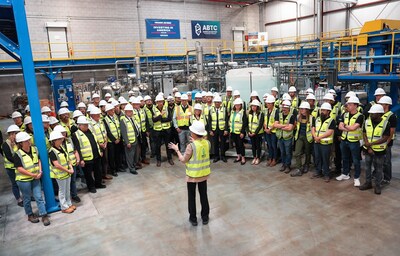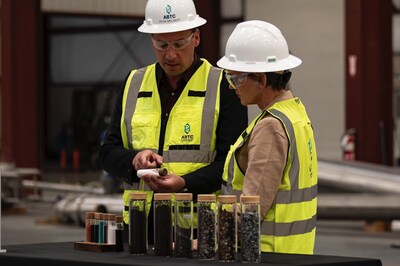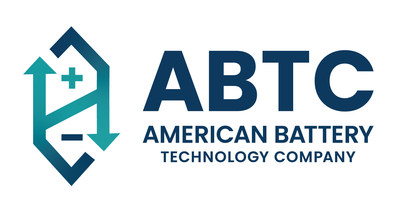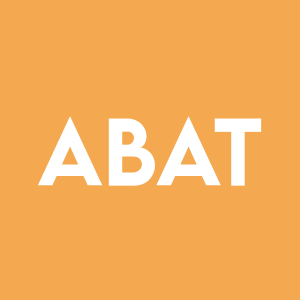US Department of Energy Secretary Jennifer Granholm Tours American Battery Technology Company Commercial Facilities
American Battery Technology Company (NASDAQ: ABAT) recently hosted U.S. Department of Energy Secretary Jennifer Granholm at its facilities. The visit spotlighted ABTC's pioneering lithium-ion battery recycling plant and its novel lithium hydroxide manufacturing from Nevada-based claystone resources. ABTC's demonstration plant, funded by a U.S. DOE grant, successfully produced lithium hydroxide. The company plans to scale this technology to a commercial refinery with a capacity of 30,000 tonnes per year, supported by a $115 million project grant. The recycling facility uses an innovative de-manufacturing process to produce battery-grade materials. ABTC has received several DOE grants, including $40 million for a new commercial recycling facility and $57 million for the lithium hydroxide refinery.
- Successful operation of lithium hydroxide demonstration plant.
- Received $115 million DOE grant for commercial refinery construction.
- Lithium hydroxide production from unconventional claystone resources.
- Innovative lithium-ion battery recycling process operational.
- Support from strategic partners and stakeholders.
- Awarded $20 million for scaling recycling operations.
- Awarded $40 million for new commercial recycling facility construction.
- Reliance on grants and federal support for project funding.
Insights
American Battery Technology Company's (ABTC) recent tour with U.S. Department of Energy Secretary Jennifer Granholm showcases significant progress and potential for the company's future. The completion and operation of the lithium hydroxide demonstration facility ahead of schedule, supported by U.S. DOE grants, indicate strong execution capabilities. This development is significant, considering the $115 million project for a commercial-scale refinery, with a
Financially, the successful operation of these facilities could lead to considerable revenue growth for ABTC, especially with the projected 30,000 tonnes per year production capacity. Additionally, the multi-million dollar grants and tax credits awarded by the U.S. DOE reduce financial risk and indicate governmental support, which is a positive sign for investors. However, it is essential to monitor the execution of the commercial-scale refinery project to ensure it remains on schedule and within budget, as delays or cost overruns could impact financial performance.
In the short-term, investors might see increased confidence and potential stock price appreciation due to governmental endorsements and successful project milestones. Long-term, the focus should be on the sustained profitability and scalability of these innovative technologies. If ABTC can consistently produce lithium hydroxide at competitive costs and maintain low environmental impact, it could secure a significant market share in the battery materials sector.
The integration of first-of-kind technologies in both lithium-ion battery recycling and lithium hydroxide manufacturing from unconventional resources is a game-changer. ABTC's approach to extracting lithium from sedimentary claystone resources is particularly noteworthy. Traditional methods, designed for hard rock and brine-based resources, have not been economically viable for these unconventional deposits. ABTC's innovative process could unlock vast, previously untapped lithium resources in the U.S.
The ability to produce battery-grade lithium hydroxide with low environmental impact is crucial, given the increasing demand for environmentally sustainable solutions in the battery industry. Furthermore, the recycling technology's agnosticism to feedstock form factors enhances its versatility and potential market reach. This could position ABTC as a leader in both primary and secondary battery materials markets.
However, the true test will be scaling these technologies to commercial levels. The involvement of a premier global construction firm like Black & Veatch for the commercial-scale refinery project is a positive step, but investors should remain cautious until these technologies achieve consistent, reliable outputs at commercial scales.
The successful demonstration of ABTC's lithium hydroxide production from unconventional resources has significant implications for the U.S. battery supply chain. Given the lack of large deposits of conventional lithium resources in the U.S., the ability to exploit sedimentary claystone resources domestically is a strategic advantage. This could reduce reliance on foreign lithium sources, aligning with broader national interests in securing a domestically-sourced battery supply chain.
ABTC's integrated approach to battery materials manufacturing and recycling supports a closed-loop system, enhancing supply chain security and sustainability. This is increasingly important as the electric vehicle (EV) market expands, driving up demand for battery-grade lithium products.
Investors should also consider the broader market potential. ABTC's technologies could attract strategic partnerships and further governmental support, as evidenced by the presence of various stakeholders during Secretary Granholm's visit. However, competitive pressures and technological advancements from other players in the battery materials market should be monitored closely.
"I'm very proud of our team for constructing and commissioning ahead of schedule our multi-tonne per day demonstration system for the manufacturing of battery grade lithium hydroxide from our own
During the visit, Secretary Granholm toured ABTC's lithium hydroxide from claystone demonstration facility, its lithium-ion battery recycling plant, and met several ABTC strategic partners and stakeholder leaders who participated in the tour and events.
The tour started with ABTC's lithium hydroxide from claystone demonstration facility highlighting the company's integrated, first-of-kind process train specifically designed to access the lithium in these types of US-based unconventional resources to produce a low-cost and low environmental impact lithium hydroxide monohydrate product (LiOH) that meets the rigorous specifications for use in high energy density battery cathode manufacturing. While the
With its demonstration facility now operational, ABTC is working to further evolve this technology by constructing a commercial-scale 30,000 tonnes lithium hydroxide per year refinery utilizing this system design directly at its Tonopah Flats Lithium Project, which has been identified as one of the largest lithium resources in the
After touring the LiOH pilot plant, the Secretary viewed the commercial lithium-ion battery recycling operations. The ABTC recycling facility utilizes a first-of-kind integrated set of recycling processes based on a strategic de-manufacturing approach that utilizes a deconstruction process combined with a targeted selective hydrometallurgical process. This system is agnostic to feedstock form factors and can process lithium-ion batteries and manufacturing scrap of a variety of sizes and shapes, and with a wide range of internal chemistries. The first phase of the recycling process produces recycled products that includes copper, aluminum, steel, a lithium intermediate, and a black mass intermediate material, and the integrated second phase further refines these materials into battery grade nickel sulfate, cobalt sulfate, manganese sulfate, and lithium hydroxide.
Several strategic partners and civic leaders joined the tour, including:
- Tom Burns, Executive Director,
Nevada Governor's Office of Economic Development - Andrew Clinger, Vice President for Administration & Finance, University of
Nevada ,Reno - Jessica Diss, Northern Nevada Legislative Director, Office of Senator Cortez-Masto
- Jon Dunham, AVP, Managing Director of Mining & Metals, Black & Veatch
- Joni Eastley, Tonopah Main Street and Tonopah Town Board, Vice Chair
- Mridul Gautam, Vice President of Innovation and Research, University of
Nevada ,Reno - Brady Hays, Sr. Vice President & Executive Managing Director, Energy Resources, Process Industries, Mining and Manufacturing, Black & Veatch
- Benjamin Knudsen, Vice President Research, North America, BASF
- Jackie Pierrott, VP of Government Affairs, Nevada Battery Coalition
- Kristen Wahl, Director of Energy Justice and Workforce Readiness for Advanced Energy Technologies, Argonne National Laboratory
Bringing first-of-kind technologies to market, ABTC's battery recycling and primary battery metals commercialization efforts support the buildout of a domestically-sourced battery metals circular supply chain. ABTC has been selected for several competitive grant awards supporting the advancement and commercialization of its first-of-kind technologies for both recycling and primary LiOH manufacturing.
- October 2021: ABTC was selected for a
$2 million $500 thousand - November 2022: ABTC was selected for a
$20 million U.S. DOE to scale, optimize, and commercialize three next generation techniques to even further enhance the performance of the recycling train, with a federal cost share of$10 million - March 2024: Awarded qualifying advanced energy project tax credits (48C) for
$20 million - March 2024: Awarded qualifying advanced energy project tax credits (48C) for
$40 million
- October 2021: ABTC was selected for a
$4.5 million U.S. DOE for the demonstration of battery-grade lithium hydroxide precursor production fromNevada claystone resources, with federal cost share of$2.27 million - October 2022: ABTC was selected for a
$115 million U.S. DOE to construct a commercial-scale lithium hydroxide refinery, with a federal cost share of$57 million
About American Battery Technology Company
American Battery Technology Company (ABTC), headquartered in
Forward-Looking Statements
This press release contains "forward-looking statements" within the meaning of the safe harbor provisions of the
![]() View original content to download multimedia:https://www.prnewswire.com/news-releases/us-department-of-energy-secretary-jennifer-granholm-tours-american-battery-technology-company-commercial-facilities-302179090.html
View original content to download multimedia:https://www.prnewswire.com/news-releases/us-department-of-energy-secretary-jennifer-granholm-tours-american-battery-technology-company-commercial-facilities-302179090.html
SOURCE American Battery Technology Company











